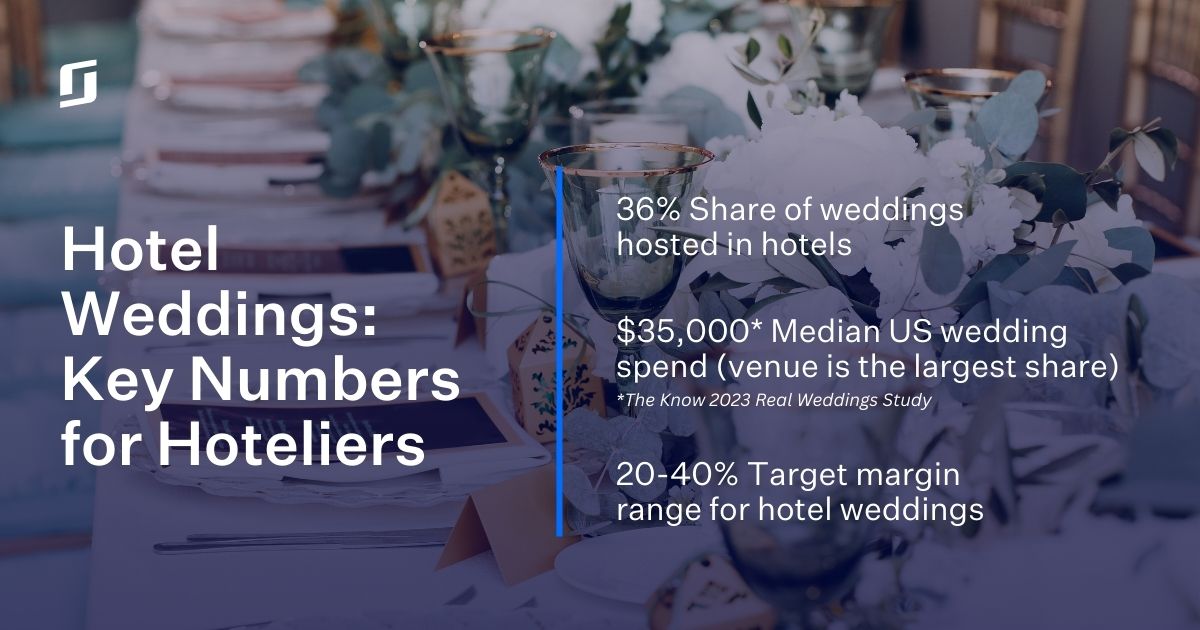What is a hotel wedding?
A hotel wedding is a full wedding experience delivered within one property, where ceremony, reception, and related events are hosted across hotel spaces and coordinated by in-house teams. It combines event venues, catering, accommodation, and operations into a single, managed service.
In this article, we’ll explore why hotel weddings are a strategic revenue opportunity, what couples expect from wedding venues, and how to create profitable packages that scale across your properties.
Table of contents
Why is hosting hotel weddings important for hotel owners?
Hotel weddings convert existing assets into high-value bookings that touch nearly every department. They build a dependable pipeline of F&B, rooms, and ancillary spend and turn each event into a showcase for future business. Learn how to maximise hotel wedding revenue in our complete playbook.
The commercial upside goes beyond the event itself. Weddings stabilise occupancy during low-demand periods by driving weekend bookings and extended stays for nights before and after the celebration, and they produce predictable banquet revenue that helps you plan labour, stock, and cash flow. Guests often extend their visit for rehearsals, brunches, or spa appointments, which multiplies the value of a single booking without adding new fixed costs.
Key takeaways:
- Weddings convert single dates into multi-department revenue streams. One booking activates rooms, F&B, spa, and ancillary services simultaneously, while extended stays for rehearsals and brunches multiply value without new capacity investment.
- Predictable event pipelines enable operational precision. Advance bookings for low-demand periods and weekends stabilize cash flow, improve labour planning, and reduce waste across purchasing and inventory management.
- Each celebration organically promotes your brand. Satisfied guests become testimonials, social content creators, and repeat customers for anniversaries or corporate events; creating compound marketing value with each successful wedding.
Turn wedding demand into revenue with SiteMinder
Simplify group bookings, room blocks, and event coordination with SiteMinder’s connected platform that keeps every property in perfect sync.
Learn about our channel manager
What do couples expect from a hotel wedding venue?
Couples look for an all-in-one setting that makes planning simple while still feeling personal and memorable. They want flexible spaces, thoughtful amenities, and a responsive team that manages every detail, from initial inquiry, to the event wrap-up.
- Size and space. Couples value spaces that adapt to their guest count and celebration preferences. Movable partitions, adjacent pre-function areas, and options for indoor and outdoor segments help them design a day that flows naturally.
- Facilities and amenities. Practical features influence shortlists. Couples pay attention to sight lines for speeches, acoustic treatment, staging options, and reliable AV for live music or playlists.
- Rooms and suites. Accommodation is often the deciding factor. Couples want a spacious suite for preparations, a quiet floor allocation for families, and a simple way to manage room blocks.
- Catering and staff. The quality of food, service timing, and staff demeanor determine how the day feels. Couples expect creative menus, flexibility for dietary needs, and tasting sessions to refine choices.
- Decor and atmosphere. A venue that adapts to different aesthetics wins more enquiries. Offer a neutral base palette, curated decor packages, and the option to bring in preferred stylists.
- Parking and transport. Clear directions, plentiful parking, valet options, and accessible drop-off zones reduce stress.
Key takeaways:
- Convenience and clarity drive selection. A single-property plan with strong communication reduces stress and builds confidence.
- Adaptability sells the vision. Show how your rooms transform through layout, lighting, and styling so couples can envision their celebration in your spaces.
- Execution is the memory. Skilled staff, well-paced service, and thoughtful amenities shape what couples and guests remember and recommend.
Streamline multi-property operations with SiteMinder’s CRS integrations
We connect your central reservation system with top distribution channels, automatically syncing rates and inventory across all of your properties to lower your cost of distribution.
Learn More
How can you create a hotel wedding package?

Strategic context for wedding packages:
- Hotels already capture a significant share of demand. With 36% of weddings hosted in hotels, clear, tiered packages help you convert enquiries into commitments by making value obvious and delivery reliable.
- The wedding market is substantial and experience-driven. The global wedding industry is valued at about USD 1.3 trillion, and packages that blend dining, décor, and stays capture spend across multiple lines without adding new fixed assets.
- Competition is intense, so differentiation matters. With more than 200,000 venues in the U.S., distinct inclusions, upgrade pathways, and standardised processes help you stand out and protect margins.
Given this competitive landscape, your package strategy determines whether you capture or lose this high-value demand.
Your package serves as both a decision framework for couples and an operational guide for your teams. The best packages define scope, pricing, and service parameters clearly, while leaving space for personalisation and upsell. When built well, packages increase average booking value, shorten sales cycles, and reduce operational guesswork.
Below is a practical five-part approach that balances guest appeal with operational control.
1. Define your offerings
Lead with what your property does exceptionally well. That might be a signature chef’s menu, a panoramic ceremony setting, or a reputation for service. Put those strengths in your core inclusions and frame them in language that connects to what couples want to feel on the day. Be explicit about what is included and what can be added, from ceremony chairs and staging to late-night snacks and a premium bar.
2. Structure tiered packages
Structure three levels that scale in experience and price. A foundation package might include venue hire, three-course dining, basic styling, and a drinks option. A mid-tier could add upgraded menu selections, enhanced styling, and an extended bar. A top tier might include a tasting dinner, premium wines, elevated decor, and a suite stay with a late checkout. Keep differences easy to understand and straightforward to execute.
3. Offer value-add services
Offer a curated menu of optional extras that feel personal and effortless. Welcome receptions, signature cocktails, photo backdrops, rehearsal dinners, farewell brunches, and spa sessions are proven winners. When partnering with third-party specialists, pre-negotiate rates and service standards, then present them as integrated options, so couples get one proposal and one payment path.
4. Design clear presentation materials
Make packages visible on your website with clear copy, honest imagery, and sample timelines that show how the day flows in your spaces. Use real-event galleries and short videos that demonstrate transformations from ceremony to first dance. Ask recent couples to provide testimonials about your team and experience, which you can place alongside package details to build trust at the point of consideration.
5. Build operational systems to support delivery
Centralise group inventory, rate plans for wedding blocks, and availability so sales, events, and front office work from the same source of truth. A connected platform like SiteMinder helps your team keep room blocks accurate, display the right rates, and capture direct bookings through the booking engine while maintaining visibility across all booking channels.
Key takeaways:
- Clarity converts. A well-scoped, tiered structure helps couples choose quickly and lets your team cost, staff, and deliver with confidence.
- Personalisation grows value. Smart add-ons give couples creative control while lifting average spend without complicating operations.
- Connected systems reduce effort. Shared inventory and integrated booking tools keep pricing, availability, and communication aligned.
How does an all-inclusive hotel wedding boost revenue?
All-inclusive packages create a single, comprehensible price that covers the experience couples care about and the costs you need to control. When ceremony, reception, and rooms are bundled, you raise perceived value, improve forecasting, and unlock upsell points that feel like personalisation rather than pressure.
A single scope lets you book staff with precision, consolidate purchasing, and avoid invoice fragmentation that confuses couples and ties up your team. From a guest perspective, one contract and one coordinator reduce cognitive load, which speeds decisions and lowers the chance of last-minute changes.
All-inclusive packages also enhance long-term value. Because couples and guests experience your full service range in one seamless package, they’re more likely to return for anniversaries or recommend your property for corporate events, having seen your complete capabilities rather than isolated services.
The comprehensive nature of all-inclusive celebrations creates richer social content. Multiple touchpoints including welcome receptions, ceremony, and the morning-after breakfast, give guests more moments to capture and share, amplifying your organic visibility beyond what single-service bookings generate.
Key takeaways
- Bundling raises perceived value and average spend. Couples see convenience and clarity, while you capture more revenue per booking.
- Simplified scope protects margins. One package improves staffing accuracy, purchasing efficiency, and billing transparency.Complete experiences build loyalty. A smooth, well-managed celebration turns couples and guests into repeat customers and advocates.
Frequently asked questions about hotel weddings
How much revenue can hotels generate from wedding bookings?
Venue spend is a major component of wedding budgets, and hotels are well positioned to capture it because they package space, dining, and rooms. In the United States, couples spend a median of USD 35,000 on their wedding, with venue costs representing the largest share according to The Knot 2023 Real Weddings Study. Hotels typically add incremental revenue through extra nights, bar extensions, and next-day dining, which amplifies the value of each event.
What profit margins should hotels aim for on wedding packages?
A realistic target range is 20% to 40%, influenced by menu mix, staffing model, vendor approach, and room-block performance. Margins improve when inclusions are pre-costed, upgrade paths are simple, and delivery relies on core in-house capabilities rather than ad hoc outsourcing. Shared systems for sales, events, and rooms make it easier to maintain those margins as volumes grow.
How far in advance should hotels book weddings?
Most bookings fall 12 to 18 months ahead, with popular dates further out. Encourage early commitment with added-value incentives such as tasting upgrades or suite enhancements instead of deep discounts. A forward calendar helps you allocate room blocks and schedule capital projects without sacrificing peak event dates.
What wedding services should hotels outsource vs provide in-house?
Keep control of experiences that define your brand, such as culinary, service, and coordination. Outsource specialist creativity or technical roles that benefit from dedicated expertise, including live entertainment, large-format florals, specialty lighting, or videography. Use preferred vendor agreements with service standards and backup plans to keep quality consistent.
How can hotels market their wedding venue to couples?
Lead with social proof and clarity. Show real weddings and share short testimonials that speak to service, food, and coordination. Publish packages, sample timelines, and a simple enquiry path, then maintain visibility where couples and planners search with tools like SiteMinder.


